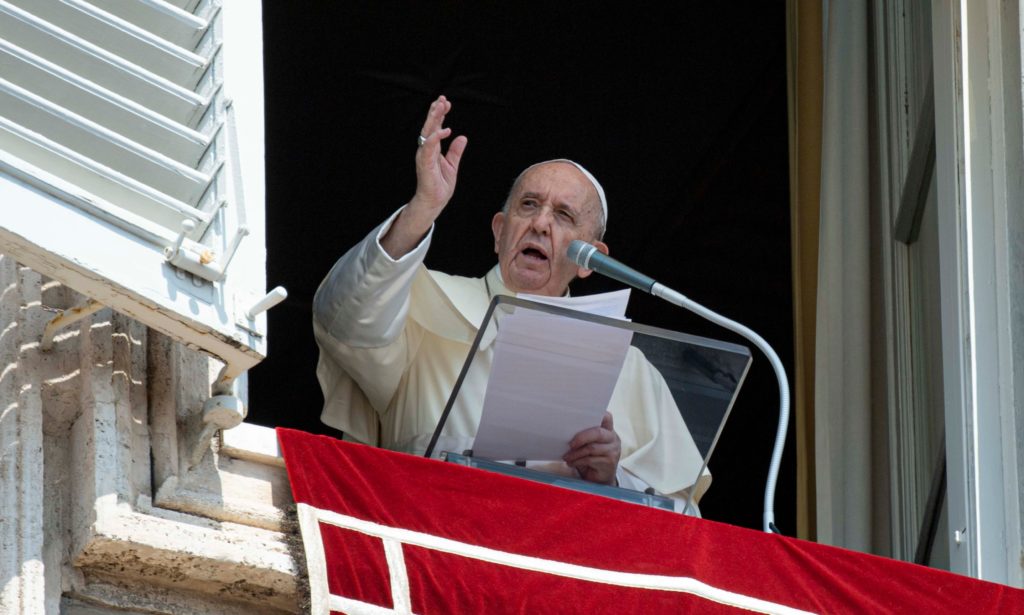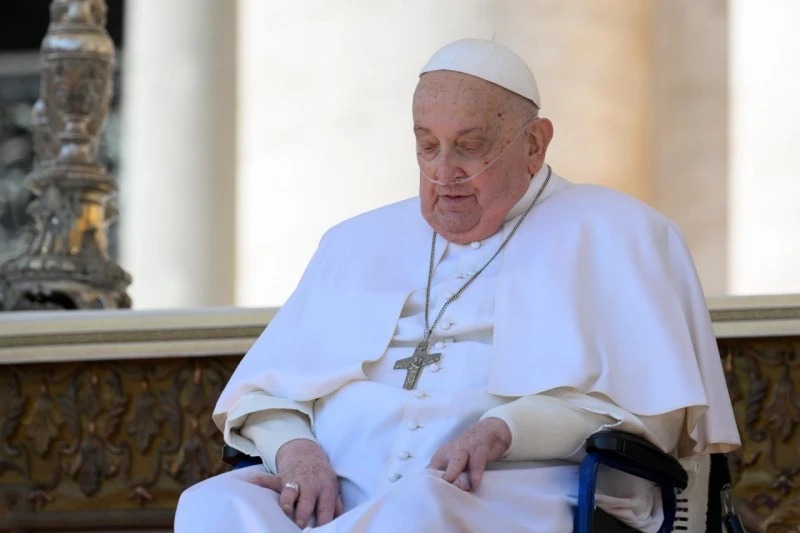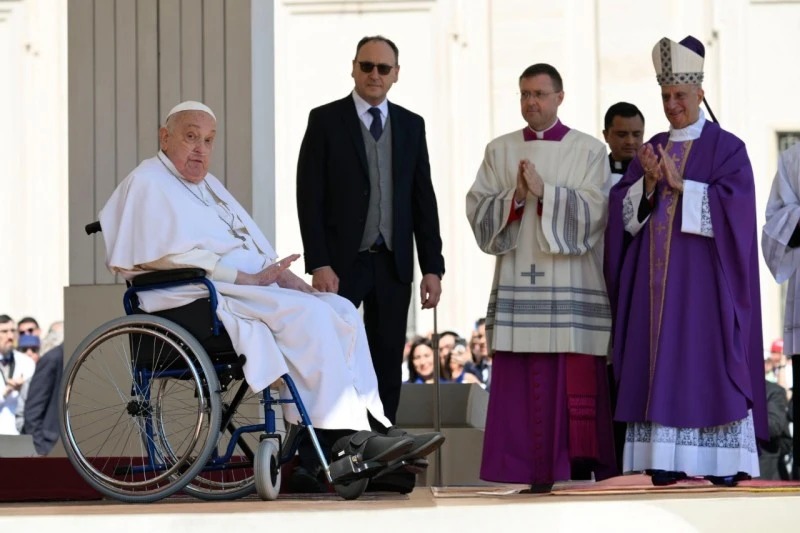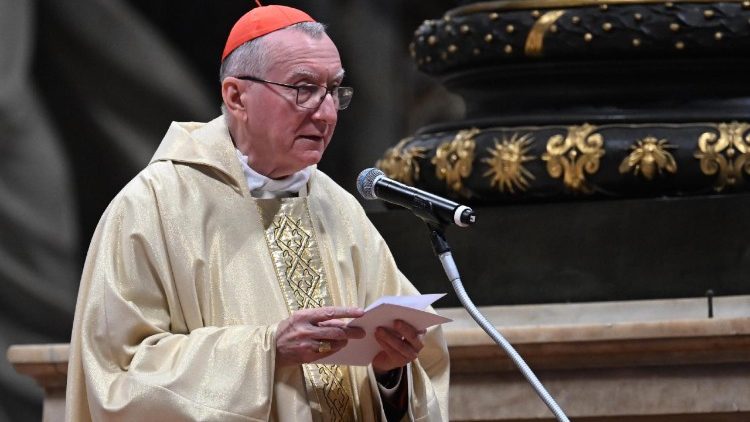Angelus: Path to Greatness is Service
'If Anyone Would be fFrst, he must be last of all and Servant of all'

The path to greatness is service, Pope Francis said today before praying the noonday Angelus with the faithful in St. Peter’s Square.
The Holy Father based his comments on the gospel of the day (Mk 9:30-37), the famous passage in which the disciples are debating which of them is the greatest. Jesus sets them straight: “If anyone would be first, he must be last of all and servant of all” (v. 35).
“If you want to be first, you need to get in line, be last, and serve everyone,” the Pope stressed. “Through this shocking phrase, the Lord inaugurates a reversal: he overturns the criteria about what truly matters.
“The value of a person does not depend anymore on the role they have, the work they do, the money they have in the bank. No, no, no, it does not depend on this. Greatness and success in God’s eyes are measured differently: they are measured by service.”
Following is the Holy Father’s full commentary, provided by the Vatican:
Dear brothers and sisters, Buongiorno!
The Gospel of today’s Liturgy (Mk 9:30-37) narrates that, on the way to Jerusalem, Jesus’ disciples were discussing “with one another who was the greatest” (v. 34). So, Jesus directed harsh words toward them that are still valid today: “If anyone would be first, he must be last of all and servant of all” (v. 35). If you want to be first, you need to get in line, be last, and serve everyone. Through this shocking phrase, the Lord inaugurates a reversal: he overturns the criteria about what truly matters. The value of a person does not depend anymore on the role they have, the work they do, the money they have in the bank. No, no, no, it does not depend on this. Greatness and success in God’s eyes are measured differently: they are measured by service. Not on what someone has, but on what someone gives. Do you want to be first? Serve. This is the way.
Today, the word “service” appears a bit hackneyed, worn out by use. But it has a precise and concrete meaning in the Gospel. To serve is not a courteous expression: it means to act like Jesus, who, summing up his life in a few words, said he had come “not to be served, but to serve” (Mk 10:45). This is what the Lord said. Therefore, if we want to follow Jesus, we must follow the path he himself traced out, the path of service. Our fidelity to the Lord depends on our willingness to serve. And we know this often costs, because “it tastes like a cross”. But, as our care and availability toward others grows, we become freer inside, more like Jesus. The more we serve, the more we are aware of God’s presence. Above all, when we serve those who cannot give anything in return, the poor, embracing their difficulties and needs with tender compassion: and we, in turn, discover God’s love and embrace there.
After having spoken of the primacy of service, Jesus does something precisely to illustrate this. We have seen that Jesus’ actions are stronger than the words he uses. And what is that action? He takes a child and puts him in the midst of the disciples, at the center, in the most important place (cf. v. 36). In the Gospel, the child does not symbolize innocence so much as littleness. For like children, the little ones depend on others, on adults, they need to receive. Jesus embraces those children and says that those who welcome a little one, a child, welcome him (cf. v. 37). The ones who are to be served above all are those in need of receiving who cannot give anything in return. To serve those who need to receive and cannot give anything in return. In welcoming those on the margins, the neglected, we welcome Jesus because He is there. And in the little one, in the poor person we serve, we also receive God’s tender embrace.
Dear brothers and sisters, challenged by the Gospel, let us ask ourselves: Am I, who follow Jesus, interested in the one who is neglected? Or am I rather seeking personal gratification, like the disciples that day? Do I understand life in terms of competing to make room for myself at others’ expense, or do I believe that being first means serving? And, concretely: do I dedicate time to a “little one”, to a person who has no means to pay me back? Am I concerned about someone who cannot give me anything in return, or only with my relatives and friends? These are the questions we need to ask ourselves.
May the Virgin Mary, the humble servant of the Lord, help us understand that to serve does not belittle us, but helps us grow. And that there is more joy in giving than in receiving (cf. Acts 20:35).
________________________________________
After the Angelus the Holy Father continued:
Dear brothers and sisters,
I am near the victims of the flooding that happened in the State of Hidalgo in Mexico, especially to the sick who died in the hospital of Tula and their families.
I want to assure my prayer for the people who have been unjustly detained in foreign countries: unfortunately, there are several cases, for different, and sometimes, complex causes. I hope that, in the due fulfillment of justice, these people might return as soon as possible to their homeland.
I greet all of you, people from Rome and pilgrims from various countries – Poles, Slovaks, those from Honduras – you are great! – families, groups, associations, and individual members of the faithful. In particular, I greet the Confirmation candidates from Scandicci and the Allievi Association (Association of Students) founded by Servant of God, Father Gianfranco Maria Chiti, a Capuchin brother, on the hundredth anniversary of his birth.
My thoughts go to those who are gathered in the Shrine of La Salette in France, on the 175th anniversary of the apparition of the Madonna who appeared in tears to two children. Mary’s tears make us think of Jesus’ tears over Jerusalem and of his anguish in Gethsemane: they are a reflection of Christ’s suffering for our sins and an appeal that is always contemporary, to entrust ourselves to God’s mercy.
I hope you all enjoy your Sunday and please, do not forget to pray for me. Enjoy your lunch and arrivederci!
The children of the Immacolata are great!
Related

The Pope: In convalescence, I feel the “finger of God” and experience his loving caress
Exaudi Staff
06 April, 2025
2 min

The experience of illness, a school in which we learn every day to love and to allow ourselves to be loved
Exaudi Staff
06 April, 2025
6 min

Francis is gradually improving: signs of recovery at the Vatican
Exaudi Staff
04 April, 2025
1 min

John Paul II: The Tireless Pilgrim Who Continues to Inspire the World
Exaudi Staff
03 April, 2025
2 min
 (EN)
(EN)
 (ES)
(ES)
 (IT)
(IT)

